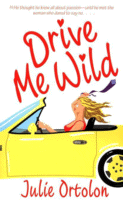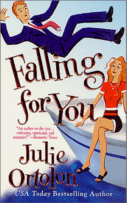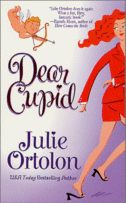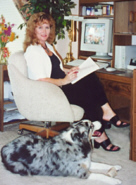A Conversation With Julie Ortolon
by Claire E. White
Bestselling romance novelist Julie Ortolon never

|
One day her journalist husband brought home a computer, and she discovered the wonders of "spell check." She says she simply cannot describe how she felt in that moment. "That computer was like a magic box -- a gateway into a world where anything was possible. I spent every spare minute teaching myself to type, read, punctuate, and somehow get my stories out of my head and onto that glowing white screen."
Ten years, and five complete manuscripts later, she had another magical moment -- the day she sold her first book. She relates "When I got the news, I screamed and cried and made a perfectly ecstatic fool of myself."
Her first contemporary romance, Drive Me Wild, was published by Dell in March 2000 and hit the USA Today bestseller list. It was also selected by the Doubleday Book Club as a hardcover release for its Rhapsody line. Her second novel, Dear Cupid (St. Martin's Press) was released in 2001, was an USA Today bestseller and a Romantic Times top pick. Her latest book is Falling For You (St. Martin's Press), the first book in a contemporary Pearl Island trilogy set in Galveston, Texas. The Pearl Island Trilogy follows the colorful St. Claire siblings as they buy a dilapidated old mansion, rumored to be haunted by their ancestor, and turn it into a bed and breakfast. In the first book of the new trilogy, Falling for You, the vivacious youngest sister, Rory St. Claire, sets everything in motion with her penchant for dreaming big. To pull off a dream this big, though, she needs a business plan and a sizable loan. Enter Oliver "Chance" Chancellor, the staid and steady scion of Galveston's premier financier. Chance agrees to help Rorie with her dream, thereby upsetting his well-ordered existence. Publisher's Weekly says of Falling For You, "With its well-balanced blend of comic exaggeration and genuine heart, Ortolon's story is a light, thoroughly satisfying romantic confection."
Julie lives in the Texas hill country near Austin, Texas. When she's not writing, you might find her trying out new recipes, reading, painting or spending time with her husband. She spoke to us about her latest book, how she made the move from successful businesswoman to bestselling romance author, and why graphic is not always better when it comes to love scenes.
When you were a little girl, what did you dream about becoming when you grew up?
Anything related to making movies like a director, set designer, or makeup artist.
How did you get your start as an artist? What kind of training did you have?

|
How did you get your own gallery? What was the greatest challenge of owning a gallery?
Another artist and I started doing framing out of her spare bedroom. We did work mostly for other artists and art galleries. The business exploded and we opened our own gallery. Pretty soon, we were representing local artists, doing our own artwork, selling jewelry from Santa Fe, designing clothing and furniture. It just took off, much faster than we expected or could handle. And that was the challenge: the speed at which it grew.
What led up to getting your first book published? Did you use an agent?
It took me ten years of hard work, lots of sacrifices (including the gallery) in order to focus on writing, and four manuscripts that didn't sell before I finally sold my fifth manuscript, Drive Me Wild. I had an agent for the last five of those years. She never lost faith in my ability, and gave me lots of encouragement. I think she was nearly as excited as I was when she called me on Friday, January 22, 1999, at 9:22 a.m. to give me the news.
What kept you going during the years before your first book was accepted for publication?
Blind faith. Which is ironic, since I'm a fairly insecure person, but I never doubted I'd get published. Although, most of the authors I know had that same absolute certainty that they'd sell. It's something you know in your gut.
I'd like to talk about your latest book, Falling for You. How did this book come about?
The inspiration came from lots of little, unrelated things. I love B&Bs, ghost stories, old legends, and trilogies about siblings. While I was developing with the idea, my husband and I took a trip to Galveston, and all the pieces clicked into place.
The heroine of the book is Rory St. Claire: she's smart, she's a hard worker and she's a bit unconventional. She's also suffered quite a bit in school because of her severe dyslexia. How did you create character of Rory?
Rory popped into my head full blown, as many of my characters do. Although, I didn't realize she was dyslexic until I was well into the rough draft.

|
Way more than I intended! The scene you're referring to, for instance, is pretty much straight from my own life. Other parts of me that showed up in Rory are her insecurities and social anxiety. Now, if only I could have her body, I'd consider it an even trade.
The hero of the story is Chance, a handsome young banker who comes from old money. What was the greatest challenge in writing Chance?
Keeping him from realizing he was hopelessly in love with Rory right from the beginning. They were so perfect for each other, some days I just wanted to smack him! But it would have been out of character for him to make a major, life-changing decision that fast, and I had to respect that.
The book is set on Galveston Island, which is charmingly portrayed in the book. Have you spent a lot of time in Galveston? What do you enjoy about it?
I love Galveston! Going down there to do research has been one of the best things about writing this series. I love the fresh seafood, touring the old mansions, shopping on The Strand, the history. I love that town!
In Dear Cupid, you addressed the issue of a parent who has a child with asthma, and the issues of single parents dating. What prompted your decision to write about these issues?
| "Love scenes can be risqué and explicit, but I like them to be pertinent to the story. Although, honestly, I prefer suggestive, sensual, and emotional over graphic detail. That's very difficult to pull off and takes a lot of work." |
Your books are known for their sense of humor, snappy dialogue and interesting characters. How important do you think it is to have a sense of humor in life?
I think it's imperative to survive. When I started writing, I didn't set out trying to be funny. I just wanted my books to be honest and populated with real people. Humor is a way of dealing with all the icky stuff life throws at you. And my books deal with some pretty icky stuff beneath the humor: divorce, shattered dreams, losing one or both parents.
I'd like to talk about the actual process of writing. Would you describe a typical writing day for you? (schedule you keep, surroundings etc.)
When I'm just starting a book, I write for about 4 to 6 hours in the morning, until I run out of steam, then do research or non-writing stuff like shopping, gardening, or working out at the gym. Although the story is always churning in my head. It takes me about 8 to 10 months to finish the rough draft. Then I work around the clock for 2 to 4 months to polish it and send it off. While I'm waiting to hear back from my editor about revisions, I start the rough draft for the next book. Then stop that to do revisions. Then back to the rough draft, and so on.

|
When you start a new book, how much of the plot do you know in advance?
Quite a bit, since I plot backwards. The end is usually the first scene that comes to me. Even with the series I'm working on, the Pearl Island trilogy, I started with the end of the last book and worked backward to come up with how the first book would start. Now, granted, the stories don't always go the way I expect. My characters frequently take over and do things their own way, but the end usually stays intact.
How do you approach writing love scenes? Is there anything that turns you off when you are reading a love scene?
Gratuitous scenes that aren't character specific and don't advance the relationship are a big turn off for me as a reader. Scenes can be risqué and explicit, but I like them to be pertinent to the story. Although, honestly, I prefer suggestive, sensual, and emotional over graphic detail. That's very difficult to pull off and takes a lot of work.
Do you let anyone read your work before you send it off to your editor? How helpful do you think critique groups are?
| "I think [a sense of humor] is imperative to survive. When I started writing, I didn't set out trying to be funny. I just wanted my books to be honest and populated with real people. Humor is a way of dealing with all the icky stuff life throws at you. And my books deal with some pretty icky stuff beneath the humor: divorce, shattered dreams, losing one or both parents." |
Falling For You is the first book in the new Pearl Island trilogy. Can you give us a sneak peek into the next book in the series?
In Lead Me On, sweet, shy Allison St. Claire shocks everyone when she has a wild fling with one of the inn's guests, Scott Lawrence. Scott is a famous suspense novelist with a bad case of writer's block looking for some serious down time. Scott and Alli are both convinced they want hot sex and nothing else, so they're none too pleased when they find themselves falling in love. Readers will also learn more about the ghosts and even get to go scuba diving in the cove to see the shipwreck. It's scheduled for release in January 2003.
As an artist, what attracts you to a romance book cover? What bothers you?
I think simple works best. And you should be able to read the title and the author's name from across the room. Art that's too busy or cliché bothers me. So far, my favorite cover for my own books is the one coming up, Lead Me On. It's fresh, clean, romantic, and fun.
What are your favorite ways to relax and have fun when you're not writing?
Cooking, shopping, and reading.
 |
Be honest about human behavior, true to your characters, and listen to you gut instinct.
What are your pet peeves in life?
Going to the grocery store. Love to cook, hate going to the store.
What was the most romantic gesture you've ever heard of (or experienced)?
One year for Christmas -- during that long ten year stretch when I was trying so hard to get published -- my husband gave me a case of printer paper. I bawled my eyes out.
Return to the July 2002 issue of The IWJ.
More from Writers Write
